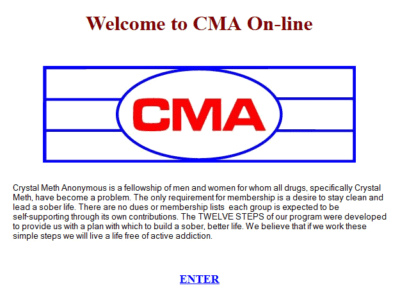CMA’s Tech History
 In the early days of CMA we did our business via snail mail. People from other parts of the USA came to Los Angeles to learn about CMA and would ask “how to start meetings” in their locality. To this end we developed CMA’s first website in 1999. It functioned using FrontPage — an early website builder.
In the early days of CMA we did our business via snail mail. People from other parts of the USA came to Los Angeles to learn about CMA and would ask “how to start meetings” in their locality. To this end we developed CMA’s first website in 1999. It functioned using FrontPage — an early website builder.
2005/2006

We have been asked why we decided to go with a Content Management system for CMA and not entirely code our website. Our website is big enough that updates needed to be done on a regular basis and by a variety of personnel. We needed a path to the future for our fellowship members to contribute today and tomorrow. Since 1999 our website has been hosted at Media Temple. Because of Joomla!’s continued improvements with private component development, we had the capacity to do many of the things we wanted to do in the past. Now, the technology has completely changed with new processes, better page load times and security since our early days.
From 2006 to 2020, our meeting directory component was SobiPro with updates, they continued to improve the product. As our CMS Joomla! was Open Source (OS), many of the components were not. The independent developers of these components having a stake at being profitable, had continued to improve functionality and security. SobiPro was good until we decided in 2020 to make a bold move to a new platform.
2009/2014
In 2009 we developed our first CMA Store. It ran on a store OS package called OsCommerce which is an e-commerce and online store-management software. A few years ago the CMA GSO Finance Advisory Committee decided they wanted to change the store and the store was moved to an offsite platform. This is the current CMA Store.

Thanks to the Internet Archives known as the Way Back Machine (hello Sherman) we invite you to come explore what we were doing in 2009 on the web including our p.o. box 555 Newsletter. Even this cma-service website had an earlier version. Unfortunately being a subdomain at that time it is not recorded on the Way Back Machine. In 2013 the CMA website looked like this.
After a reboot of the CMA Service website in 2017, it has grown to the place to go for those in service to CMA. The old CMA Conference website (now folded into the GSO website) was dedicated to Conference information including the Conference Charter and Conference Reports.
Each CMA website has had over 70,000 pieces and parts along with MySQLi databases helping us keep organized. On the websites we host, we use blind email systems to guard the privacy of our volunteers. No outside parties have inadvertent access to our volunteers information. On our server and server’s websites, we use active firewalls.
2020/2021
During the 2020 pandemic we began the process of moving our entire CMA platform from Joomla! to WordPress. The WordPress platform allowed us access to the “12-Step Meeting List” from the folks at Code4Recovery . In 2021 we launched the new CMA GSO website, folding in both the Conference and App websites. As our meetings increase across the planet they are added to our new CMA Meeting Directory.
The new CMA Service portal launched in 2022.
In 2024 C4R released the “WordPress Meeting Plug-in timezone update” and now our meetings list in your local browsers time.
the Future
We ask you to search your CMA community and look for those web people willing to become trusted members of the Communications Committee – specifically the Worldwide CMA Technology Workgroup. WordPress! experts would be best, but people familiar with other content management systems should be able to work this platform without too much learning curve.